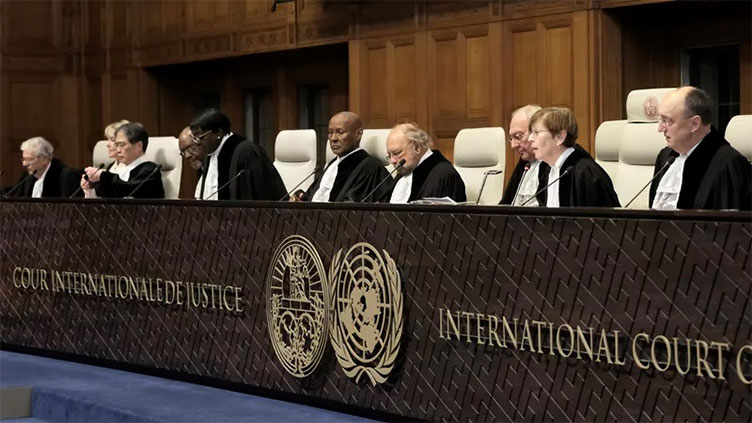Israel rejects genocide accusations at World Court

World
Israel rejected as "grossly distorted" accusations brought by South Africa at the UN's top court.
THE HAGUE (Reuters) - Israel on Friday (Jan 12) rejected as "grossly distorted" accusations brought by South Africa at the UN's top court that its military operation in Gaza is a state-led genocide campaign against the Palestinian population.
It called on judges to dismiss South Africa's request to halt its offensive, saying it would leave it defenceless.
South Africa, which filed the lawsuit at the International Court of Justice (ICJ) in December, asked judges on Thursday to impose emergency measures ordering Israel to immediately halt the offensive.
It said Israel's aerial and ground offensive - which has laid waste to much of the narrow coastal enclave and killed more than 23,000 people according to Gaza health authorities - aimed to bring about "the destruction of the population" of Gaza.
South Africa's interpretation of events was "grossly distorted", Israel's foreign ministry's legal adviser Tal Becker told the court.
"If there were acts of genocide, they have been perpetrated against Israel," adding: "Hamas seeks genocide against Israel."
Israel launched its all-out war in Gaza after a cross-border rampage on Oct 7 by militants from Hamas, which is sworn to Israel's destruction. Israeli officials said 1,200 people were killed, mainly civilians, and 240 taken hostage back to Gaza.
"The appalling suffering of civilians, both Israeli and Palestinian, is first and foremost the result of Hamas' strategy," Becker said, adding that Israel had a right to defend itself. Hamas denies Israeli allegations that its militants hide among civilians.
"Israel is in a war of defence against Hamas, not against the Palestinian people, to ensure that they do not succeed," Becker said, adding: "The key component of genocide, the intent to destroy a people in whole or in part, is totally lacking"
Palestinian backers with flags marched through The Hague and planned to watch proceedings on a giant screen in front of the Peace Palace. As Becker spoke, they chanted: "Liar! Liar!"
"GENOCIDE"
Israeli supporters were holding a separate gathering of family members of hostages taken by Hamas.
By asking the court to order the halt of the Gaza military operation "the applicant seeks to thwart Israel's inherent right to defend itself ... and render Israel defenceless," Becker said.
"The application and request (by South Africa) should be rejected for what they are, a libel," Becker said.
Israel has said South Africa was acting as a mouthpiece for Islamist Hamas, which is widely designated as a terrorist group in the West. South Africa has rejected that accusation.
The ICJ's decisions are final and without appeal - but the court has no way to enforce them.
The 1948 Genocide Convention, enacted in the wake of the mass murder of Jews in the Nazi Holocaust, defines genocide as "acts committed with intent to destroy, in whole or in part, a national, ethnical, racial or religious group".
Since Israeli forces launched their offensive, nearly all of Gaza's 2.3 million people have been driven from their homes at least once, causing a humanitarian catastrophe.
Post-apartheid South Africa has long advocated the Palestinian cause, a relationship forged when the African National Congress' struggle against white-minority rule was cheered on by Yasser Arafat's Palestine Liberation Organisation.
The court is expected to rule on possible emergency measures later this month, but will not rule at that time on the genocide allegations - those proceedings could take years.
"THANK YOU SOUTH AFRICA!"
Many Palestinians in the occupied West Bank welcomed the case.
For them, the charges represent a chance to bring world attention to what they see as Israel's historic suppression of their fundamental rights, and South African flags were flown in many cities in the West Bank.
"Israel was built upon the crimes it committed against the Palestinian people," Prime Minister Mohammad Shtayyeh told a rally at Nelson Mandela Square in Ramallah, where marchers defying the winter rains chanted "Thank you South Africa!"
"This is a test for humanity," said Bassam Zakarneh, a member of the Revolutionary Council of the Fatah movement that dominates the Palestinian Authority, which exercises limited self rule in the West Bank.
Atieh Jawabra, 68, a former political science professor at Al-Quds University Abu Dis, said he had long been waiting for Israel to appear before an international court for its crimes, which he said go back to the mass expulsion of Palestinians during the 1948 war of Israel's founding, known as the Nakba.
"Israel, the United States and the West have put Israel above the law over the course of its history," he said.
But some, like shepherd Issa Taamri, said the case was unlikely to change their life.
Israel's expansion of settlements around the West Bank city of Bethlehem, where he lives, has severely shrunken the area his sheep can graze in, he said.
"The world has been making promises for 75 years to no avail," he said.


